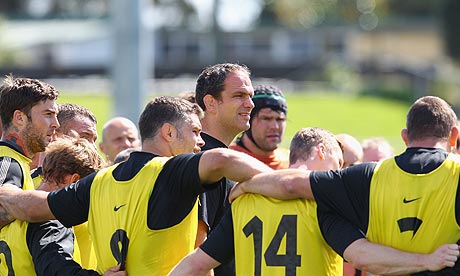
Martin Johnson's future as England's team manager will be decided at the beginning of next month when the Rugby Football Union's council considers a recommendation from the professional game board.
The decision of the RFU's board of directors on Wednesday to abort the inquiry headed by Fran Cotton into England's World Cup campaign frees the union's operations director, Rob Andrew, a member of the game board, to finish his review of a campaign that became bogged down by various off-field incidents involving players.
Before reporting to the council on 2 December, Andrew will discuss his findings with his fellow game board members: Ian Metcalfe, the chairman who is on the RFU board; Damien Hopley, the chief executive of the Rugby Players Association; Mark McCafferty, the chief executive of Premiership Rugby; and Jason Leonard, England's most capped international.
Cotton was last month asked to head an inquiry by the RFU's acting chief executive, Martyn Thomas, shortly after England had been knocked out of the World Cup by France. Metcalfe was angry because he had not been consulted and the players and the Premiership clubs said they would not co-operate with the review.
The board of directors decided this week that Thomas had acted without the necessary authority in commissioning the Cotton inquiry and jettisoned it while agreeing that Thomas's ties with the RFU would end next month when his contract as acting chief executive is up.
Johnson has made no comment about his future since returning from New Zealand. His contract ends on 31 December and it will be down to the game board to recommend whether he should be offered a new deal. The futures of his coaching team will also be discussed.
Even though Thomas, who has expressed support for Johnson, will remain in office until 16 December but he will play no part in the process. He will effectively be on gardening leave in the office, with all operational decisions passing to the RFU's chief finance officer, Stephen Brown, who will take over as acting chief executive on 17 December.
Andrew recommended to the board of directors in 2008 that Johnson should be appointed team manager, six months after Brian Ashton had guided England to an unlikely World Cup final. It has been taken as a sign that he will support Johnson's retention but his preference then had been for Ashton to carry on and be bolstered by a manager, the former England captain Phil de Glanville, only to be instructed to interview England's 2003 World Cup-winning captain, who had had no involvement in the game in the three years since he had retired from playing, and persuade him to take the helm.
The decision over Johnson will be made after consultation with the team manager, his coaches, the players and others who were involved in the World Cup campaign. One of the reasons for Johnson's appointment was that the RFU was concerned that poor selection had bedevilled the two previous England regimes and his lack of managerial and coaching experience was not considered to be important. If he is retained, he is likely to be fortified by successful coaches.
Although Andrew will be part of the process, his own position will be reviewed in the new year, with the RFU board of directors committed to an independent review of performance systems up to the 2015 World Cup. The board will decide next month who should head the review and, although the removal of Thomas has been taken as a sign that Sir Clive Woodward is unlikely to return to Twickenham as the performance director, what the regime change will mean is that the interview process will be paramount when it comes to filling jobs. The emphasis will be on transparency.
By delaying the performance review until the new year, the RFU is ensuring that the new chief executive, who is expected to be named in six weeks, will have a say in any structural and personnel changes, rather than be bound by decisions made by others.
The way the RFU is run will change next month when a report by the legal firm Slaughter and May is considered by the council. Some members want one of the two independent nonexecutive directors who were elected to the Union's board this week, Miles Templeman and Andrew Higginson, to take over as chairman from Paul Murphy next July to ensure a smooth working relationship between the elected members and the executive staff.
The council meeting will also consider the fallout from this week's board meeting. A number of directors will be questioned about why they did not carry out the recommendations of the Blackett report in July to strip Thomas of all his roles on the RFU for his part in the sacking of John Steele as chief executive.
Their support of Thomas ended on Wednesday. The directors had been told that not only had more than 130 clubs signed letters calling for a special general meeting at which a vote of no confidence would be taken in Thomas and those members of the board who had been party to Steele's dismissal, but the rebels had double that number again in pledges of support.
The Blackett report had recommended that Thomas be kept on as executive chairman, a paid position, of England Rugby 2015, the World Cup organising body, but he lost that this week and a replacement will be named next month, with the RFU's former chief executive, Francis Baron, an option. In addition, the rebels want the former Union president, John Owen, removed from the 2015 board because of his support of Thomas.

